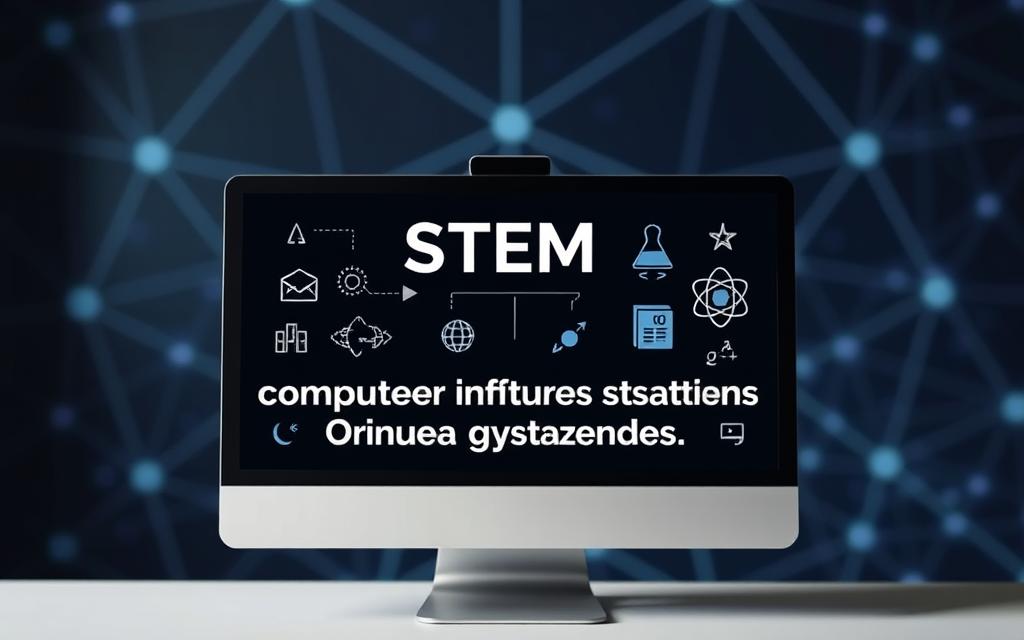The classification of Computer Information Systems (CIS) as a STEM major is significant for students, particularly international students on F-1 visas, as it affects their post-graduation opportunities in the United States. The CIS major at JMU is a STEM-designated program that equips students with both business acumen and technical skills to design, build, and deliver competitive computer-based solutions.
This program combines the technical aspects of technology with business applications, creating a unique educational pathway. Understanding the STEM classification of CIS is crucial for students to grasp the full range of career prospects and funding opportunities available to them.
What Is Computer Information Systems?
Computer Information Systems (CIS) is an academic discipline that integrates computing technology with business principles to solve organisational problems. As a field, it prepares students to tackle complex challenges by combining technical skills with business acumen.
Core Components of CIS Education
CIS education encompasses a range of core components, including programming fundamentals, database management, systems analysis, network infrastructure, and business applications. These elements work together to provide students with a comprehensive understanding of how technology can be leveraged in business contexts.
How CIS Differs from Computer Science
While both CIS and Computer Science deal with computing, they have distinct focuses. CIS is more about applying technology to business problems, whereas Computer Science emphasises theoretical foundations and algorithm development. The table below highlights key differences between the two fields.
| Aspect | Computer Information Systems (CIS) | Computer Science |
|---|---|---|
| Focus | Applying technology to business contexts | Theoretical foundations and algorithm development |
| Curriculum | Includes business management principles and technical computing subjects | Emphasises computer programming, algorithms, and software development |
| Career Path | Prepares students for roles that bridge IT and business operations | Prepares students for technical roles in software development and research |
CIS programmes are designed to equip students with the skills necessary to design, build, and deliver competitive computer-based solutions. By combining technical and business knowledge, CIS graduates are well-positioned for careers that require both technical expertise and business acumen.
Is Computer Information Systems a STEM Major?
To determine if Computer Information Systems is a STEM major, it’s essential to understand the STEM designation criteria and how CIS programmes align with these standards.

The classification process involves evaluating the programme’s focus on scientific principles, technological applications, engineering methodologies, and mathematical foundations.
Official STEM Classification Criteria
Educational authorities and government agencies designate programmes as STEM based on their focus on scientific principles, technological applications, engineering methodologies, and mathematical foundations.
How CIS Meets STEM Requirements
CIS programmes meet STEM requirements through their technical components, including programming, database design, systems architecture, and quantitative analysis, aligning with STEM educational objectives.
For international students on F-1 visas, being part of a STEM-designated programme can qualify them to extend their post-graduation stay in the United States.
The Hybrid Nature of CIS Programmes
The Computer Information Systems (CIS) programme is characterised by its hybrid nature, combining technical computing elements with business management principles. This blend of disciplines enables students to develop a comprehensive understanding of information systems and their applications in business contexts.
Technical Components That Qualify as STEM
CIS programmes include technical components such as programming, database design, and systems architecture, which are fundamental to the STEM field. These elements involve the application of scientific methods and mathematical concepts to solve computing problems, qualifying them as STEM disciplines.
Business Elements in CIS Curriculum
In addition to technical components, CIS programmes incorporate business elements, including management principles, organisational behaviour, and business communication. These elements equip students with the skills necessary to understand the business applications of information systems and to bridge the gap between technical and business departments within organisations.
Benefits of STEM Classification for CIS Students
The STEM classification of Computer Information Systems (CIS) programmes offers numerous benefits to students. With CIS being recognised as a STEM field, students can reap multiple benefits.
Financial Aid and Scholarship Opportunities
CIS students in STEM-designated programmes can access expanded financial aid, including specialised scholarships and grants. Governmental and private sources provide funding for research, enhancing their educational experience.
Visa Extensions for International Students
For international students on F-1 visas, the STEM designation allows for Optional Practical Training (OPT) extensions. This enables them to work in the United States for up to 36 months after graduation, instead of the standard 12 months.
Career Opportunities for CIS Graduates
The comprehensive education provided by CIS programmes prepares graduates for a multitude of career opportunities in the technology sector. CIS graduates are equipped with both technical and business knowledge, making them versatile candidates for various roles in organizations.
Technical Roles in IT and Computing
CIS graduates often pursue technical roles such as systems analyst, database administrator, network engineer, application developer, and information security specialist. These roles require a strong foundation in computing and technology, which CIS programmes provide. Key skills include problem-solving and the ability to implement solutions.
Business-Oriented Technology Positions
In addition to technical roles, CIS graduates are also well-suited for business-oriented technology positions. These include business analyst, IT consultant, technology product manager, and chief information officer. Such roles leverage the graduate’s understanding of both business needs and technological capabilities, enabling them to drive solutions that meet organisational problems.
| Role | Key Skills | Industry Demand |
|---|---|---|
| Systems Analyst | Technical knowledge, problem-solving | High |
| Business Analyst | Business acumen, technical understanding | High |
| Information Security Specialist | Security protocols, risk management | Very High |

Skills Developed in CIS Programmes
Computer Information Systems (CIS) programmes are designed to equip students with a comprehensive skill set that is highly valued in today’s technology-driven job market. According to a survey by Hart Research Associates, 93% of employers consider a candidate’s ability to think critically, communicate clearly, and solve complex problems as the most important factor in hiring decisions.
Technical Skills and Competencies
CIS students acquire a range of technical skills, including programming languages, database design and management, systems analysis and design, network administration, cybersecurity principles, and data analytics. These technical competencies are crucial for developing effective IT solutions.
Business and Management Capabilities
In addition to technical skills, CIS programmes also focus on developing business and management capabilities, such as project management, business process analysis, strategic IT planning, and understanding organisational behaviour. This enables graduates to articulate the business value of technological solutions and manage their deployment within organisations.
| Skill Category | Specific Skills |
|---|---|
| Technical Skills | Programming, Database Management, Systems Analysis, Network Administration |
| Business Capabilities | Project Management, Business Process Analysis, Strategic IT Planning |
The combination of technical and business skills enables CIS graduates to implement technological solutions effectively and manage their deployment within organisations.
How Universities Classify CIS Programmes
CIS programmes are housed in different faculties across institutions, impacting their STEM status and educational approach. The classification of these programmes can significantly influence their curriculum, accreditation, and ultimately, the career paths available to graduates.
Variations in Programme Classification
The placement of CIS programmes within universities varies; some are part of business schools, while others are housed in computer science departments or dedicated information systems schools. For instance, JMU’s CIS program is part of the College of Business, offering specialisations like business intelligence and computer security management.
Accreditation Considerations
Accreditation is crucial for CIS programmes, with business accreditation (e.g., AACSB) and computing accreditation (e.g., ABET) playing significant roles. Dual accreditation can strengthen a programme’s credentials, indicating that it meets rigorous standards in both business and computing disciplines.
When selecting a CIS programme, prospective students should evaluate both the programme’s classification and its accreditation status, considering how these factors align with their career goals and whether STEM designation is important for their educational and professional plans.
Conclusion: The Value of CIS as a STEM Discipline
In conclusion, Computer Information Systems emerges as a robust STEM discipline, merging technical computing expertise with business acumen. CIS programmes meet STEM criteria through their technical components, offering added value with business context and applications. Graduates are uniquely positioned to bridge technical and business domains, enhancing their career prospects. The STEM classification benefits CIS students with financial aid, visa extensions for international students, and improved job opportunities. Prospective students should evaluate CIS programmes based on their career goals and the programme’s classification and accreditation.
FAQ
What are the core components of a Computer Information Systems (CIS) education?
CIS education encompasses a broad range of topics, including programming, data management, software development, and business management. Students learn to design, implement, and manage information systems that meet the needs of organisations.
How does CIS differ from Computer Science?
While both CIS and Computer Science deal with computing and technology, CIS focuses on the application of these technologies in a business context. CIS programmes emphasise the development of technical skills alongside business acumen.
What are the benefits of STEM classification for CIS students?
The STEM classification of CIS programmes can provide students with access to financial aid and scholarship opportunities. International students may also be eligible for visa extensions.
What career opportunities are available to CIS graduates?
CIS graduates can pursue a range of technical roles in IT and computing, as well as business-oriented technology positions. They are equipped to work in various industries, including finance, healthcare, and government.
What skills do CIS programmes develop in students?
CIS programmes develop a range of technical skills, including programming and data analysis, as well as business and management capabilities. Students learn to apply these skills to solve organisational problems.
How do universities classify CIS programmes?
Universities may classify CIS programmes differently, depending on their specific curriculum and focus. Some may be classified as STEM programmes, while others may be housed within a business school or faculty of science.
What are the accreditation considerations for CIS programmes?
CIS programmes may be accredited by organisations that specialise in computing and business education. Accreditation can ensure that programmes meet certain standards and provide students with a high-quality education.











